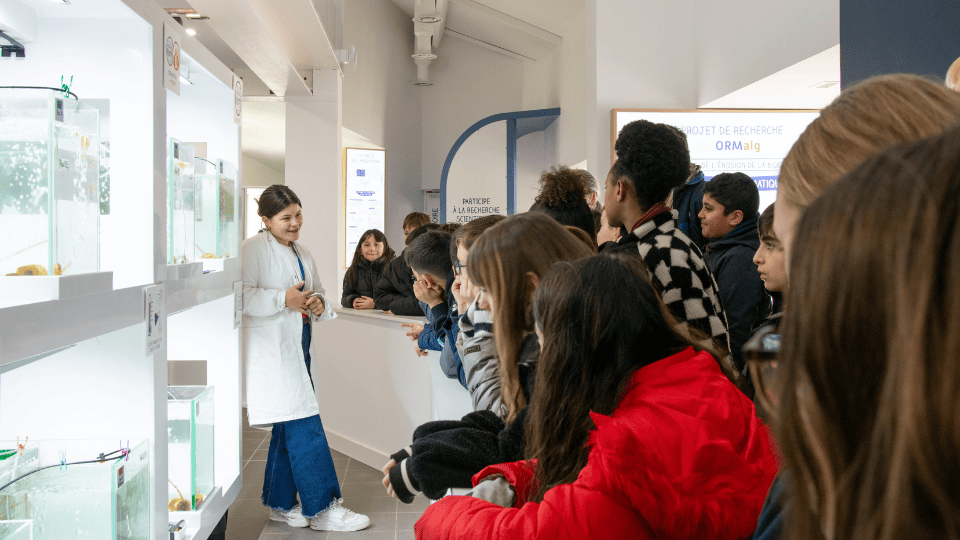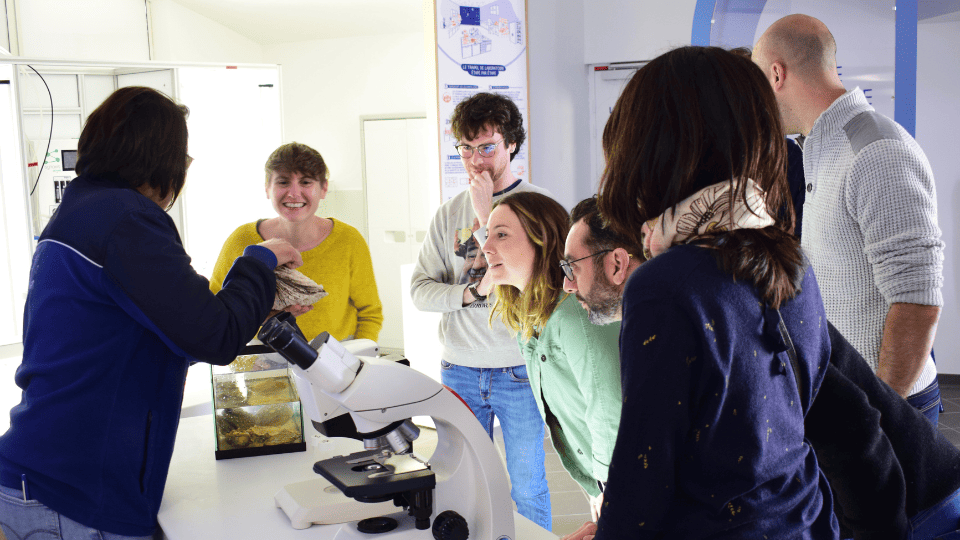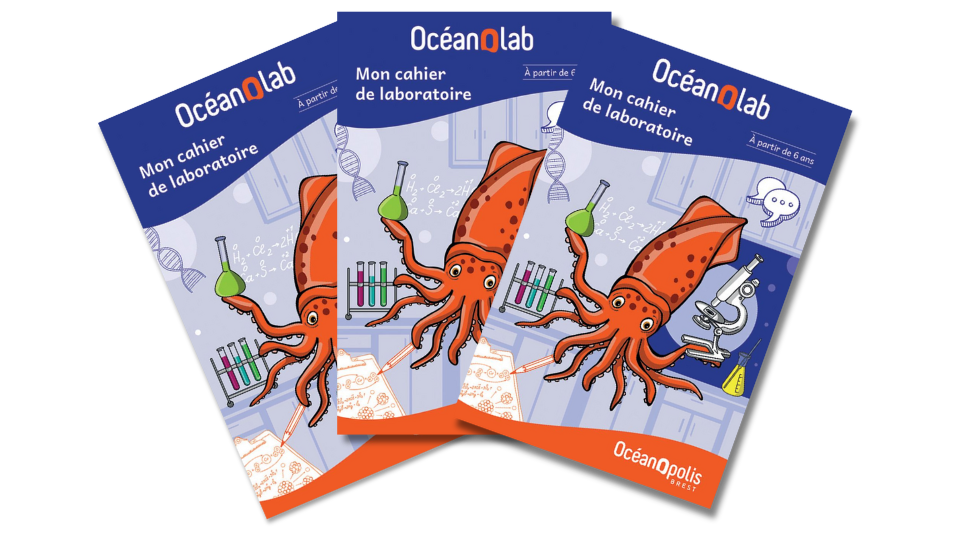
Océanolab,
share ongoing scientific research
An immersive dive into the heart of marine ecology research in the context of global change.
What is Océanolab?
Océanolab is the first experimental marine ecology platform open to the public.
This laboratory, located at the heart of the visitor pathway through Océanopolis, brings together scientists and citizens around long-term research projects (~1 year) addressing climate change, pollution, and biodiversity loss. By conducting their experiments directly in front of the public and under the same conditions as in their institutional laboratories, scientists share their work, research themes, and tools with everyone.
Thanks to a dedicated exhibition design developed by the Océanopolis team, the science communication tools highlight each research project and make it accessible to all visitors. Every year, the space is reinvented to host a new research project, a new theme, and a new scientific team.
This 160 m² area, located at the exit of the Brittany Pavilion, is open on Wednesdays, weekends, public holidays, and during school vacations. Scientific residencies last about a year and are open to the public from early February to late November.
A place where science can meet society
Océanolab gives scientists the opportunity to share their knowledge with the public. They explain their activities, the scientific process, the complexity and long timeframes involved in research, and discuss these issues. Océanolab invites researchers to step outside their laboratories and engage with a society that has questions for them.
What you can see during your tour à Océanolab
An experimental system
As you wander through Océanolab, you will notice the tanks where scientists conduct their research: lights, bubbles, pipes, glassware, laboratory equipment drying on workbenches… They have a whole arsenal of experimental equipment at their disposal (thermoregulation, CO₂ enrichment, effluent treatment) connected to a direct supply of seawater. Thanks to these devices, they study the effects of climate change, and/or pollution on local species.
Every day, here, they observe, measure, note, and question… and you too can ask the scientists present. It’s a unique opportunity to discover, firsthand, science “in the making.”
A scientific laboratory
The analysis laboratory is reserved for scientists, but you can still see it inside Océanolab. With equipment similar to that found in university or institute laboratories (scales, microscopes, dissection equipment, fume hoods, and even a centrifuge), scientists can prepare samples, store them, and even carry out initial analyses.
Once packaged, the samples can be sent to specialized laboratories for more in-depth analysis using state-of-the-art equipment.
A photobioreactor
Behind this somewhat technical name lies a valuable tool: the photobioreactor allows algae, microscopic or otherwise, to be cultivated under perfectly controlled conditions. Temperature, light, nutrients… everything is regulated to promote their development. The two large tanks visible at Océanolab house photosynthetic algae, cultivated with precision by scientists.
Why cultivate them? Because these algae, like phytoplankton, are the basis of marine food webs. They can be studied themselves, or researchers can use them as food source for other species in their experiments.
Explanatory boards
Numerous explanatory panels created using visual graphic facilitation techniques are displayed at Océanolab. They help you better understand the challenges of global change and ongoing research projects. They also describe how the scientific equipment will be used by scientists.
A mobile laboratory bench
The mobile laboratory bench is a central feature of Océanolab. Playground for the Oceanopolis’ scientific mediators and the visitors, it is the starting point for the activities offered during your tour. Equipped with a binocular magnifying glass and a microscope that allow visitors to observe what is happening on screen in real time, it offers a unique opportunity to illustrate, explain, and experiment. A genuine tool to bring science and society closer together.

Things to do at Océanolab
With its spaces entirely dedicated to the general public, Océanolab invites you to dive into the world of marine research and gain a concrete understanding of how scientists are currently working on major ocean-related issues.
Accompanied by a scientific mediator from Océanopolis, you will discover the species being studied, the experimental protocols, and the major research topics currently being explored: climate change, marine pollution, biodiversity erosion, and more. But not only! You will as well discover how critical thinking works and what are the different steps of the scientific methodology. During your visit, you will have access to scientific equipment (microscopes, binocular magnifying glasses, underwater cameras) to observe the invisible, such as plankton, the tiny giants of the seas.
Here, science “in the making” unfolds before your eyes!
Practical information
Price
No extra charge: all visits are included in the Océanopolis entry ticket.
Opening dates and times
Except during school holidays: on Wednesdays, weekends, and public holidays / every day during school holidays.
Terms of access
Guided tours available upon reservation at the reception desk of the Brittany pavilion, free access to the exhibition space.
Location
At the “Jardin d’Armorique”, between the Pavillon Bretagne and the event space.
Two tour formats to discover Océanolab
Open access tour
Open to everyone aged 6 and up, this self-guided visit allows you to freely explore the space and discover ongoing experiments alongside a science communicator.
Available on Wednesdays, weekends, and public holidays outside school holidays, and every day during school holidays.
Included in the Océanopolis admission ticket.
Free access, no booking required, from age 6.
More information on schedules: oceanopolis.com
Guided tour
Dive deeper behind the scenes of research! For about one hour, follow a science communicator to meet and exchange with the researchers, engineers, and technicians involved in the project in residence.
Available on Wednesdays, weekends, and public holidays outside school holidays, and every day during school holidays.
Included in the Océanopolis admission ticket.
Registration at the Brittany Pavilion reception desk, subject to availability.
From age 8.
More information on schedules: oceanopolis.com
Visits for schools
A 1.5-hour workshop for middle and high school students, led by a scientific guide, to discover marine ecology research in the context of global changes.
🎓 To organize a visit, please contact the mediation team at +33 2 98 34 40 57.

An educational and playful notebook for young children
Designed for children aged 6 to 12, the educational workbook “My Laboratory Notebook” guides young children as they discover Océanolab.
Games, observations, mini experiments… It stimulates their curiosity, develops their critical thinking and introduces the scientific approach.